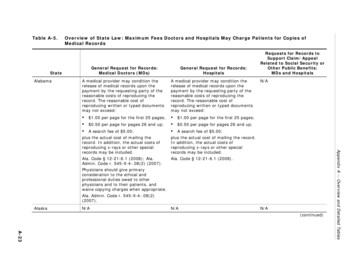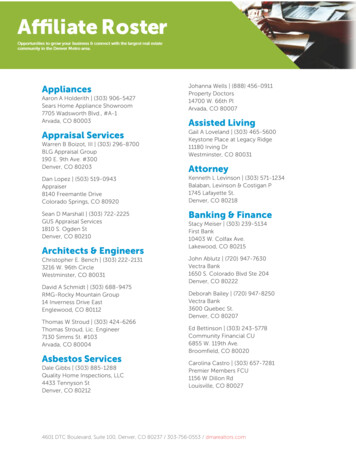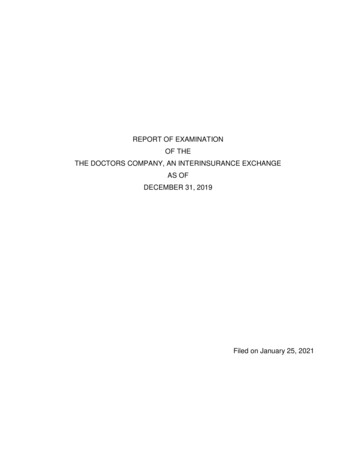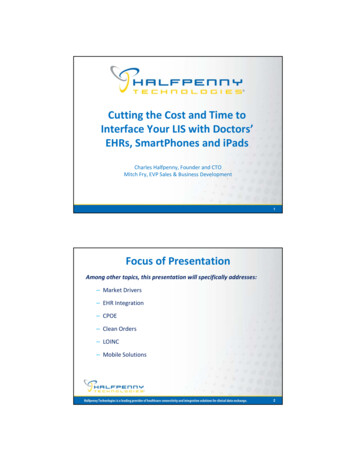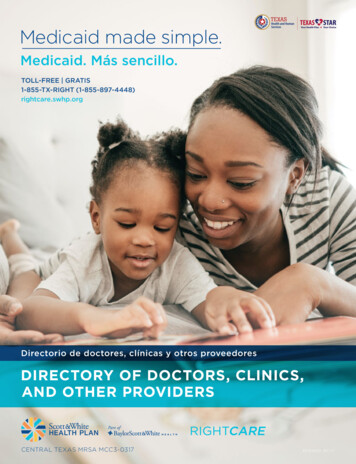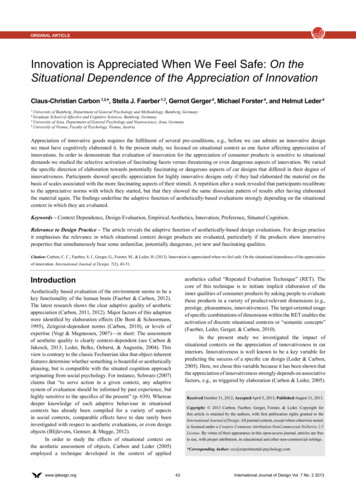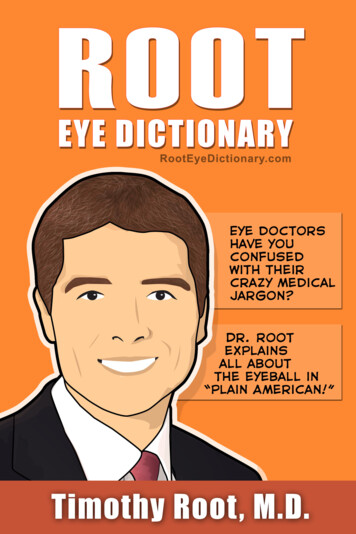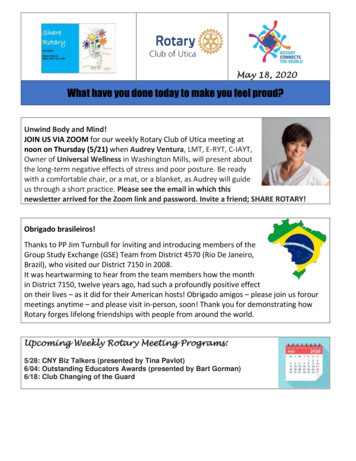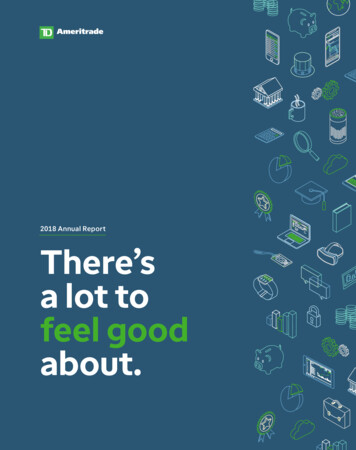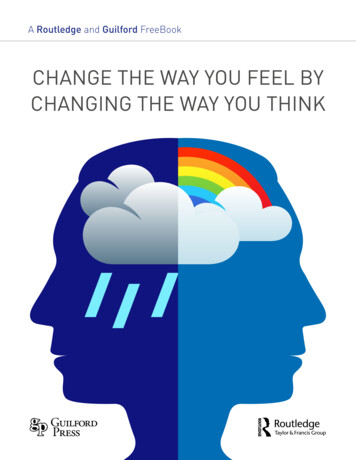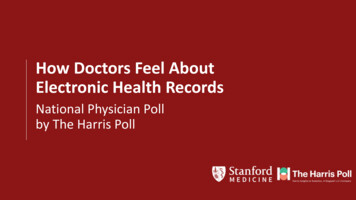
Transcription
How Doctors Feel AboutElectronic Health RecordsNational Physician Pollby The Harris Poll1
Background, Objectives, and MethodologyNew research from Stanford Medicine, conducted withThe Harris Poll examined perceptions of EHR systemsamong primary care physicians (PCPs). The research willinform a white paper drafted by Stanford Medicine, onethat is focused on identifying what problems doctors areencountering with EHRs, and then implementingsolutions.Qualified respondents were:ü PCPs (Primary medical specialty definedas Family Practice, General Practice, orInternal Medicine)Method Statement (to be included in all materials for public release):The survey was conducted online by The Harris Poll on behalf of Stanford Medicinebetween March 2 and March 27, 2018 among 521 PCPs licensed to practice in theU.S. who have been using their current EHR system for at least one month.Physicians were recruited via snail mail from the American Medical Association(AMA) Masterfile. Figures for years in practice by gender, region, and primarymedical specialty were weighted where necessary to bring them into line with theiractual proportions in the population of PCPs in the U.S.Throughout this report: Percentages may not add up to 100% due to weighting and/or computerrounding and the acceptance of multiple responses. Unless otherwise noted, results for the Total (all responding PCPs)are displayed.ü Licensed to practice in the United Statesü Using their current EHR system for a leastone month2
Key TakeawaysThe Harris Poll, on behalf of Stanford Medicine, conducted a comprehensive survey of over 500 primary-care physicians (PCPs) on electronic healthrecords (EHRs). Some key findings include:1. Doctors see value in EHRs, but want substantial improvements. While roughly two-thirds of PCPs think EHRs have generally led to improved care (63%) and are at least somewhat satisfied withtheir current EHR systems (66%), they continue to report problems Four in 10 PCPs (40%) believe there are more challenges with EHRs than benefits 62% of time devoted to each patient is being spent in the EHR and half of office-based PCPs (49%) think using an EHR actuallydetracts from their clinical effectiveness Seven out of 10 physicians (71%) agree that EHRs greatly contribute to physician burnout Six out of 10 physicians (59%) think EHRs need a complete overhaul2. EHRs aren’t seen as powerful clinical tools; their primary value, according to PCPs, is data storage (44%). Only 8% say the primary value of their EHR is clinically related3. Physicians agree on what needs to be fixed right away, and what needs to be fixed over the next decade: Nearly three out of four PCPs (72%) think that improving EHRs’ user interfaces could best address EHR challenges in theimmediate future Seven out of 10 PCPs (67%) think solving interoperability deficiencies should be the top priority for EHRs in the next decade—and 43% want improved predictive analytics to support disease diagnosis, prevention, and population health management3
Executive Summary4
Doctors see value in EHRs, but want substantial improvements.13%Two-thirds of PCPs (66%) report that they aresatisfied with their current EHR system.However, only one in five (18%) are very satisfied.18%18% Very satisfied48% Somewhat satisfied21% Somewhat dissatisfied21%13% Very dissatisfied48%Six in 10 agree that EHRs have led to improved patient care,both in general (63%), and within their practice (61%).Despite 70% saying EHRs have improved over the last five years, more than half still agree that:ü EHRs need a complete overhaul (59%)ü Using an EHR detracts from their professional satisfaction (54%)5
Time spent on EHRs effects patients relationships.While only 3% of PCPs don’t see any value in their EHR system, time constraints take a toll and patientrelationships suffer:Seven in 10 agree thatSeven in 10 disagree thatUsing an EHR has increased the total # of hoursI work on a daily basisMy EHR has strengthenedmy patient relationships74%69%71%EHRs contribute greatly to physician burnoutUsing an EHR takes valuable time away frommy patients69%More time spent in EHR than with patient31 minspent on behalf ofeach patient; 19 ofwhich spent in EHR12Interacting with patient during visit811Interacting with EHR during visitInteracting with EHR outside visit6
Physicians see EHRs as a storage—not clinical—tool;about half say it detracts from their clinical effectiveness.Nearly half of PCPs (44%) say the primary valueof their EHR is digital storage, while less thanone in 10 (8%) cite key clinically related itemssuch as disease prevention/management (3%),clinical decision support (3%), and patientengagement (2%).Half agree that using an EHR detracts fromtheir clinical effectiveness17%49%44%8%Strongly agreeagreeSomewhat agree32%7
Physicians see EHRs as a storage—not clinical—tool;about half say it detracts from their clinical effectiveness. (cont.)The EHR abilities nearly all PCPs agree areimportant are related to technology; fewer sayclinical abilities are as important.The top items PCPs are most satisfied with arealso more technological than clinical:Maintain a high-quality record ofpatient data in the EHR over time99%Maintain a high-quality record of patientdata in the EHR over time73%97%Providing patients with access tomedical records71%Provide an intuitive user experienceProviding clinical decision support inthe moment of care88%65%Identifying high risk patients in mypatient panelSharing information with providersacross the care continuum86%Supporting practice management/revenue cycle management needs60%8
Some of the most important EHR capabilities are where PCPs believethe technology is falling short.Difference(Important – Satisfied)Importance of vs. Satisfaction with EHR AbilitiesChange or adapt in response to user feedback91%44%Provide an intuitive user experience97%54%Facilitate better patient-provider interaction91%50%Coordinate care for patients with complex conditions86%52%Provide clinical decision support in the moment of careShare information with providers across the care continuumMaintain a high-quality record of patient data in the EHR over time99%73%Support my practice management/revenue cycle management needs85%60%Engage patients in prescribed care plans through mobile technologies53%Provide patients with access to their medical records72%71%Important (NET)38%32%95%65%Focusimprovementson the userexperience34%88%56%43%41%94%56%Identify high-risk patients in my patient panel47%30%26%25%19%80%9%Satisfied (NET)9
What nine in 10 physicians want: EHRs to be more intuitiveand responsive.PCPs agree that three features are crucial for EHRs: an intuitive user experience, adapting to feedback,and helping improve interactions between patients and providers. For all three, only half of PCPs aresatisfied with their EHRs’ performance at the moment.97%91%54%ImportantSatisfiedProvide an intuitive user experience91%50%44%ImportantSatisfiedChange or adapt in response to user feedbackImportantSatisfiedFacilitate better patient-provider interaction10
The short-term improvement physicians want most? Improvedinterface design.Top three improvements PCPs want to see in theshort term:Other solutions and EHR attitudes suggestthere is also opportunity to re-imagine careteams and delegate or automate EHR tasks:Improve EHR user interface design toeliminate inefficiencies and reduce screentimeOver one-quarter of PCPs (27%) indicate thatdeveloping Artificial Intelligence (AI)assistants to support physicians with patientcare and practice administration is a longterm EHR development they’d like to see inthe next 10 years.Shift more EHR data entry tosupport staffUse of highly accurate voice recordingtechnology that acts as a scribe duringpatient visits72%48%38%Most EHR tasks that I perform cannot becompleted by anyone other than atrained physician69%22%disagreeStrongly disagreeSomewhat disagree47%11
The biggest long-term development physicians want to see with EHRs:improved interoperability and predictive analytics.Over the next decade, PCPs would most like to see Interoperability (system-wide information sharing) deficienciessolvedImproved predictive analytics to support disease diagnosis,prevention, and population health managementIntegrated financial information in the EHR to help patientsunderstand the costs of their care options67%43%32%12
Nearly one in three PCPs think entrenched financial interests will bean obstacle.PCPs see the following as the biggest obstacles to future changes: cost, structure, and incentives.1 in 2 cite:48%Healthcare IT toofragmented anddisconnected1 in 3 cite:48%Cost to physician/practice30%Financial interests within thehealthcare industry are tooentrenched to change thestatus quo13
Differences emerge between PCPs based in an office and those based in ahospital.Nearly half of office-based PCPs see digital storage as the primary value of EHRs.Office-basedAgreement with:Having access to digital patientdata is imperative to high qualitycareOffice-based82%95%29 minspent on behalfof each patient;17 of which spentin EHRHospital-based128937 minspent on behalf ofeach patient; 25 ofwhich spent in EHRInteracting withpatient during visit121015Interacting with EHRoutside visitHospital-basedPrimary value of EHR:Agreement with:Digital storageUsing an EHR detracts from myclinical effectiveness51%36%I often use other means as workarounds for my EHR50%31%There are more challenges to usingEHRs than benefits44%28%47%31%Care coordination13%23%Billing/revenue cycle10%23%Office-basedInteracting withEHR during visitHospital-basedOffice-based PCPstake a harsher viewtoward EHRs.Office-basedHospital-based14
Detailed Findings15
Lukewarm satisfaction: Only one in five PCPs is “very satisfied” withEHRs—about the same who are “somewhat dissatisfied.”EHR Satisfaction18%Very satisfied48%Somewhat satisfied66%Satisfied (Net)21%34%Dissatisfied (Net)Somewhat dissatisfied13%Very dissatisfiedBase: All qualified respondents (n 521). Q805: Overall, how satisfied are you with your current EHR system?16
EHR systems take away valuable time PCPs wish they had to spendwith patients.Patient Care Attitudes and the EHR ImpactPatient Relationships and Time ConstraintsAgree (Net)Patient Care AttitudesI wish I had more time to spend with patients2% 11%I am satisfied with the amount of engagement I have with my patients during visits5%I rarely have time to address all patients’ questions/concernsEHR ImpactMy EHR has strengthened my patient relationships28%7%28%Strongly DisagreeBase: All qualified respondents (n 521). Q715: How much do you agree or disagree with each of the following statements?Base: All qualified respondents (n 521). Q820: How much do you agree or disagree with each of the following statements?29%9%Using an EHR takes valuable time away from my patients37%24%41%Somewhat t Agree87%31%Strongly Agree17
Seven in 10 PCPs say EHRs increase daily hours worked and contributegreatly to burnout.Patient Care Attitudes and the EHR ImpactProfessional SatisfactionAgree (Net)Patient Care AttitudesHaving a good relationship with my patients contributes significantly to myprofessional satisfaction1% * 12%Using an EHR has increased the total number of hours I work on a daily basisEHR Impact5% 21%EHRs contribute greatly to physician burnoutUsing an EHR detracts from my professional satisfaction6%11%Strongly DisagreeBase: All qualified respondents (n 521). Q715: How much do you agree or disagree with each of the following statements?Base: All qualified respondents (n 521). Q820: How much do you agree or disagree with each of the following statements?23%34%87%29%45%34%29%Somewhat Disagree99%74%37%71%25%Somewhat Agree54%Strongly Agree18
While a majority of PCPs believe EHRs have led to improved patient care, nearly halfstill feel their clinical effectiveness has been negatively impacted.Patient Care Attitudes and the EHR ImpactQuality of Care and Clinical EffectivenessAgree (Net)Patient Care AttitudesHaving access to digital patient data is imperative to provide high quality care4% 12%I have the tools needed to provide high-quality care4% 15%I feel less clinically effective than I did five years ago EHR Impact34%25%32%51%50%28%31%15%84%81%42%In general, EHRs have led to improved patient care12%25%49%14%63%My EHR has led to improved patient care in my practice13%26%49%13%61%Using an EHR detracts from my clinical effectiveness14%Strongly DisagreeBase: All qualified respondents (n 521). Q715: How much do you agree or disagree with each of the following statements?Base: All qualified respondents (n 521). Q820: How much do you agree or disagree with each of the following statements?36%Somewhat Disagree32%17%Somewhat Agree49%Strongly Agree Reduced base (those in practice 5 years) : Total n 483;10-20 years in practice n 175; 21 years in practice n 24019
Things are getting better, but many PCPs still say a complete overhaul isneeded and nearly half are using work-arounds often.Additional EHR AttitudesAgree (Net)EHRs have improved over the last five years10%EHRs need a complete overhaul12%My EHR is personalized to my individual role in care delivery19%Most EHR tasks that I perform cannot be completedby anyone other than a trained physicianStrongly Disagree15%22%Somewhat DisagreeBase: All qualified respondents (n 521). Q820: How much do you agree or disagree with each of the following statements?48%25%37%44%47%Somewhat Agree21%33%29%28%My EHR has adequate tools to help me navigate payment reformThere are more challenges to using EHR’s than there are benefits29%23%I often use other means (paper notes, scanning, faxing)as work arounds for my EHR21%40%30%23%Strongly ortunity tore-imagine care teams& delegate EHR tasks20
Nearly all PCPs agree on what the most important abilities of EHRsare.Importance of EHR AbilitiesImportant
Electronic Health Records National Physician Poll by The Harris Poll. 2 Background, Objectives, and Methodology New research from Stanford Medicine, conducted with The Harris Poll examined perceptions of EHR systems among primary care physicians (PCPs). The research will inform a white paper drafted by Stanford Medicine, one that is focused on identifying what problems doctors are File Size: 1MBPage Count: 33
